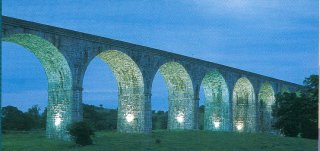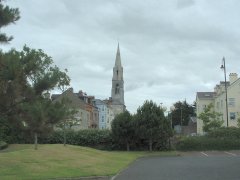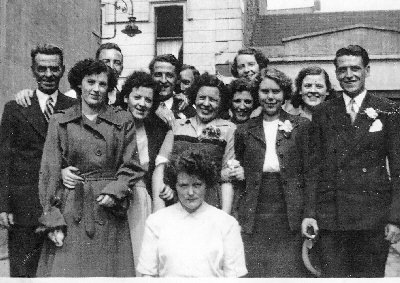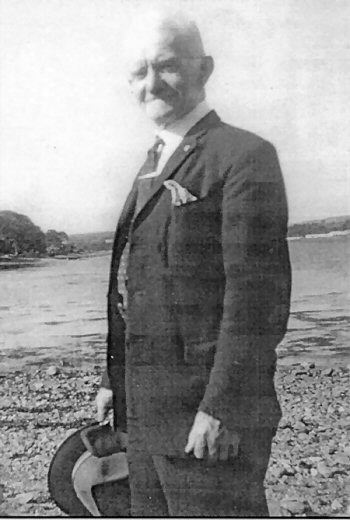Language
Oxymorons
Gullion/Fews Placenames
Slieve Gullion: either from the Ulster Cycle hero, Cu Chullain or from the Gaelic for ‘mountain of holly’
Carrickatuke: ‘rock of the hawk’: a mountain – and district – around Newtownhamilton [after Hamilton, the Planter] in the townland of Armaghbrague [false Armagh, where St Patrick is said first to have established a church]
Silverbridge: from Be
Placenames’ Derivation A
Altnamackan: Alt na Maighin =‘height of the little plain’ or ‘height of the parsnips’ if it derives instead from Alt na Meacan
Anaghaveky: An Achadh Beihhy = ‘pleasant birch field’: alternative, Eanach an Bhacaigh = ‘the beggar’s marsh’
Annaghgad: Aonach na ngaduidne = ‘the robber’s fair’: alternative, Eanach nag had = ‘osier marsh’
Annaghmar: Ath na marbh = ‘fort of the dead’ from the megalithic tomb there.
Assan: Easan = ‘waterfall’
Ballymacone: Baile Mhic Comhghain = ‘McCone’s townland’ or ‘McKeown’s townland’. So Ballynahone [Ballinahone] : ‘McCann’s townland’, and Ballynahonemore = greater McCann townland.
Ballynacarry: Baile na Cora = ‘town of the weir’
Ballynaclosha: Baile na Cluaise = ‘townland of the ear’ or ‘of sand-hole’
Ballynagapple: ‘townland of horses’
Ballinarea: Perhaps from Ree [river name, Old Irish = water] or Ri [kings]; in
Newtownhamilton, on County River – strangely, Ballinare Gardens also marks the County boundary in Newry
Ballintemple: ‘town of the church’
Ballymoyer: Baile na mhaoir = ‘townland of the stewart’, traditionally people of the name were stewarts of the Book of Armagh
Corneonagh: ‘round hill of the river’, recently perversely interpreted in a Newry housing development as ‘Carney Hall’ in the townland of Carneyhaugh (ugghh!)
Gaelic Place Names 1
Perhaps the principal extant repository of our ancient Gaelic language in everyday use among the majority of citizens is our wealth of local place names. It is important to continue to use them, especially in addressing envelopes, where they can precede the modern post codes. Drumcashellone [Eoin’s rocky hill fort] Greenan [sunny place] Meigh [plain] and so on.
The derivation is centuries – sometimes millennia old, and often disputed. The following list is neither comprehensive [in fact, just a random few, to begin with] nor undisputed and is offered for advice only. Be aware that alternative possibilities, usually just as valid, exist. Most people are happy to have one explanation to cling onto.
Drumsallagh – Mucky hill, or Hill of the Herds
Edenderry – Slope of dark trees
Coolnacrann – Remote spot of the trees
Meenan – Mossy place
Ballinskeagh – Place of hawthorns
Scarva – Watershed
Creevy – Bushy place
Derrybeg – Small oak wood
Ballyvarley – Place of the slaughter
Aghaderg Red [bloody] field [ Battle of Aghaderg c.350]
Loughbrickland Lake at Bricriu’s place
Lisnabrague – Fort of the games
Legananny – Stone of the Assembly
Lisnagead – Fort of the Hundred [from Conn of the 100 Battles]
Shankill – Old Church
Ballinteggart – Priest’s townland
We will concentrate next on place names of Creggan parish. First, by way of light distraction, a related story. You know of course, that mor and beag are big and small; coill is church and fir and mna, men and women respectively. So Kilmore derives from big church, and Kilnaman from church of the women. Keep this in mind for a moment.
It had been a long, hard winter and Tommy Donaghy, living in the townland of Kilnaman at the foot of the mountain, hadn’t seen his oul uncle Bertie from across the valley in Kilmore for some ten weeks. Bertie lived alone and wasn’t as fit to look after himself as he once was.
Tommy woke up one fine April morning and decided he’d go ceili-ing. He pulled on his clothes, his winter woollies, his heavy boots and socks, his overcoat and muffler and thick gloves and eventually he was ready to step out onto the street. It was early morning so Tommy knew he had time and enough to get there and back before dark.
He hadn’t reached the crossroads below before he was stopped in his tracks by a group of men wearing khaki uniform and talking with strange accents. Their leader raised his hand to stop Tommy.
‘Excuse me, Paddy,’ he said, for he must have mistook him for some one else, ‘But do you mind telling me where you have just come from?’
Tommy didn’t want to correct him on the name, for he thought that’d be impolite, him being a stranger and all to these parts. He smiled,
‘Sure I don’t mind at all, at all, and thank you for asking.’ He smiled again. ‘Sure I’m after coming from Kilnaman!’ Tommy concluded triumphantly.
Yer man looked at him askance. Then he called all his friends to gather round. ‘Wait till yous hear this one, fellas,’ he roared. ‘Could you tell us once more where you have just come from, Sir?’
‘No, no, no. Not Sir, at all, at all. Just plain Tommy.’ Then he remembered, ‘Or you can call me Paddy, if you like!’
‘And of course. Sure I’m just coming from Kilnaman.’
‘I’ll bet ye are! And could you tell us where you are going now?’
‘I cud surely! Sure I’m just going to Kilmore!’
The last we heard, they took Tommy off to a place called Maghaberry, where he’s living in something called an aitchblock, whatever that might be!
Photo: c.1932 Frank McCullagh, his mother Bridget, Mrs Jones, his sister Dolly – Monaghan Street
The Art of Storytelling
The storyteller’s art is a dying skill. There was until recently (there may be still, for all I know) a Newry Storytellers Group. I am a fan of the old style. My uncle was a storyteller from Sheetrim, as was his father and grandfather before. The custom belonged by the fireside of the old-style ceili house where neighbours gathered of an evening to while away the long winters’ nights. The only surviving such home that I know of is that of my dear friend Sarah Hagan, extolled elsewhere in these pages. I know of a few survivors of the storytelling genre, most notably John Campbell of Mullaghbawn [and his mate, Len Graham, and their friend Mickel Quinn]. Terry Conlon tells the odd yarn at the Thursday night Railway Bar session. Jack Lynch of Cavan is good too and there are others. In Rostrevor of a Wednesday evening (8.30 – 10.30 Rostrevor Inn, we have Alfie Corr, Kathleen Lucas and Dominic Bennett. The one I am about to tell belongs to Jack.
Perhaps the first requirement is the accent. I am hopeless for I’ve been cursed with a town accent that is totally unsuitable! Worse, I cannot assume any other accent. To my ear, it has to be a broad South Armagh lilt, or at worst, Midlands or West. The far South (Cork/Kerry) is probably good too, but no one can understand them but themselves. They must have the rare laughs at everyone else’s expense!
It helps enormously to have a seasoned, world-tired face (sorry, Terry!) with a permanent comical expression. Only the twinkling eyes can betray the teller’s real message. One must not laugh at one’s own jokes! The art probably developed as a defence against the jibes of the foreigner who loves to assume abject ignorance in all natives. The storyteller plays the assumed part with practised finesse. The foreigner, confirmed in his prejudices, departs, feeling totally vindicated with his jaundiced opinions. Behind him, everyone is roaring at his gullibility.
Many stories tell of the helpless traveller, normally a real amadan, who was a common enough figure in Ireland of previous centuries. Jamesy, the uncle, told of one such. He was cursed with an inability to properly express his emotions and constantly said the wrong thing!
He was walking the Bog Road one day when he came upon two men stuck fast in the bog hole. He roared and laughed and merrily wished them Good Day, as he had previously been advised. One man escaped from the quandary, came over and loudly scolded him for his intemperance.
‘What should I say?’ asked the amadan.
‘You should say ‘The one’s out, may the other soon be out”, he was chided.
Of course, the next poor man the amadan met on his travels had suffered a serious accident, where one of his eyes was totally removed from his head.
‘The one’s out, may the other soon be out!’ he roared gleefully.
In the story, these scenes repeat for up to twenty minutes telling. The simplicity of the twists is an essential device. The art is in the telling, and frankly, one should never commit to written words such a unique art form. I was recently given a book of Old Irish Songs, without the music. I can sing those I know. The rest read like insufferably bad poetry. Think of The Meeting of the Waters without that beautiful air. Despite this warning to myself, I am about to proceed. My justification is that there are hundreds of exiles out there who have never, and will never hear them being told as they should be. Please imagine the slow, heavily accented telling, the heavy pauses between phrases [if I wrote these in, it would spoil the imaginings] the twinkling eyes, the build-up, the throwaway punch lines, the look of bewilderment on the teller’s face that people should see the funny side of a very serious situation!
You might have heard it said by some that the South Armagh people are a bit mane – a bit tight, as they say here – but there’s not an ounce of truth in that: not a single ounce at all! – In general, that is.
In fact the only mane man I ever knew from that area was P J Brannigan from the parish of Sheetrim, in the townland of Creggan, near the village of Cullyhanna. A few miles from Crossmaglen. Have I got you located yit?
Anyway I called to visit his house wan Sunday mornin’ and wasn’t P J watching the mass on the television. And what am I going to tell ye only, when it came to the Collection time, didn’t he turn the television aff?
Another time I called hoping for a bit of a feed – seeing it was about lunch time. The mother was within, but P J was without. Out standing in his own field. Acting the scarecrow. He looked the part. He had bits of straw stuffed up his sleeves and up his trouser legs.
But he had to come in to lunch, and that’s when the crows had a bit of a feed to themselves too. P J was sitting there at his dinner and I was sitting across the table from him. Hoping for a bit of grub. The mother – she’s passed away now, God rest her – asks me would I like a cup of tea in me hand. I would, says I.
Well, she nearly scalded the hand af me!
Then I’m sitting there a long time, me elbows getting caul’ from the oilcloth on the table, till I spake up.
‘Are ye still baking yer own bread, Mrs Brannigan?’ says I, wily enough, though I say it meself.
‘Ach, I am for sure’, says she. ‘I suppose you’d be liking a cut af it?’
‘Well I wouldn’t say no’, says I. She cut me af the heel of the bread and left it down bare on the table there in front of me. I waited a while.
‘You’re probably still making yer own butter these days’, I offered with a smile.
‘You’d like a wee dab of butter?’ says she, not slow like.
It was a very wee dab of butter and I had to use my finger to spread it on the bread.
I sat another while and me not eating yet.
‘Would you like a bit of honey?’ says P J.
Well, he gave me a wee spoon of honey – and when I say a wee spoon, I mean it wasn’t even the size of an egg spoon. You’d maybe get a wren’s egg, or something on it. The wee-est dab of honey you ever seen. I looked a while and then I says,
‘I see you do be keeping a bee!’
I’ll tell you the rest of Jack’s story next time.
Story : Indian Princess
[Before reading this, please note the caveats expressed in the previous story, The Art of Storytelling].
I was talking of P J Brannigan. Well, he was the great man for travelling.
He was in Crete that often he had a girlfriend there be the name of De Milo.
She belonged to the Heraklion De Milos.
Venus, her name was.
According to P J she was the powerful woman altogether for she invented the world’s first ever sleeveless T-Shirt.
He went to Berlin too, for it reminded him of his hero, John F Kennedy. He made a speech there one time. How’s this it went, now?
Och aye, it was …’ich bin ein binliner’.
He knew China too and developed a quare turn for the language. He says to me one time … do you know, says he, what CHOP SUEY is Chinese for? And of course I didn’t. Says he, with great authority,
CHOP SUEY is Chinese for ‘number forty seven.’
While the television was still a new-fangled article in his house, he couldn’t talk about anything else. I met him one morning on the road and he says to me, says he..
‘Were ye watching the television last night?’
‘I was,’ says I, – cause I was!
‘Had ye got it switched on?’ says he.
‘I did’, says I.
The ladies tennis final was on. That’s a good few years back.
‘Did ye see yar wan winning? Wasn’t she massive altogether.
What’s this her name was?
Ah yes.. NAV-RAT-I-LOVA.’
‘That’s right,’ says I. ‘A quare name altogether. NAV-RAT-I-LOVA.’
‘Aye. And she had a first name too. Aye. MAR-TI-NA!’
‘MAR-TI-NA NAV-RAT-I-LOVA’, says I.
‘MAR-TI-NA NAV-RAT-ILOVA’, says he.
‘MAR-TI-NA NAV-RAT-I-LOVA’.
And we were hitting the name forward and back a while, like we were playing tennis too. Then all of a sudden he stopped and looked at me.
‘Now, which one of the NAVRATILOVAS would she be?’
He was up in India one time. Or In’ja, as he called it. He was out on a lake fishing for pike. With a nail gun! And what did he do, only he put a hilty nail through the bottom of the boat. Luckily enough he was just beside this wee island in the middle of the lake. Aye, Woody Island, it was called. And he managed to wade over to it.
And it was just an oul dump. People used this island for a dump. A hape of tin cans – and Milk of Magnesia bottles on it. People found this very handy, for if you have a dump on an island, no one’s gonna rogue anything off it.
He was sitting there, hoking through the rubbish heap, when he came across an aul billycan. Ah, just an aul wreck of a billycan, all dented and blackened and that. But he thought, ‘sure I could clean it up and take it home, and maybe get a bitta use outta it. Keep aul bent nails or something in it. So he spat on the billycan and gave it a rub. And what came out only a genie.
‘I, am the Genie, of the billycan,’ says he.
‘You have one wish!’
Wee, poor P J was caught on the hop, and all he could say was..
‘I wish I was home and dry in my bed.’
‘Now,’ says the Genie. ‘That’s a very simple wish and I’ll make sure you’re magiced home. But I’ll give you a wee bit of a bonus too. You’ll be lucky for the rest of your life.’
And with that, the Genie disappeared into thin air.
He was going a bit thin on the top, you see.
Then who did P J see rowing across the lake only Oweny McGovern. And Owney says, ‘I’ll give you a lift.’ Owney hadn’t the nerve to ask him why he was sitting on the island with no boat. Anyway he brought him home and dropped him at the bottom of the lane where he lived.
As P J was walking up the lane, what did he see – stuck in the branch of a sally tree – only a ten pound note. And he thought,
‘maybe that Genie was right when he told me I was going to be lucky for the rest of my life!’
He took the note and filed it away in he’s ar*e pocket.
… we’ll get round to the Indian Princess soon enough ! …





